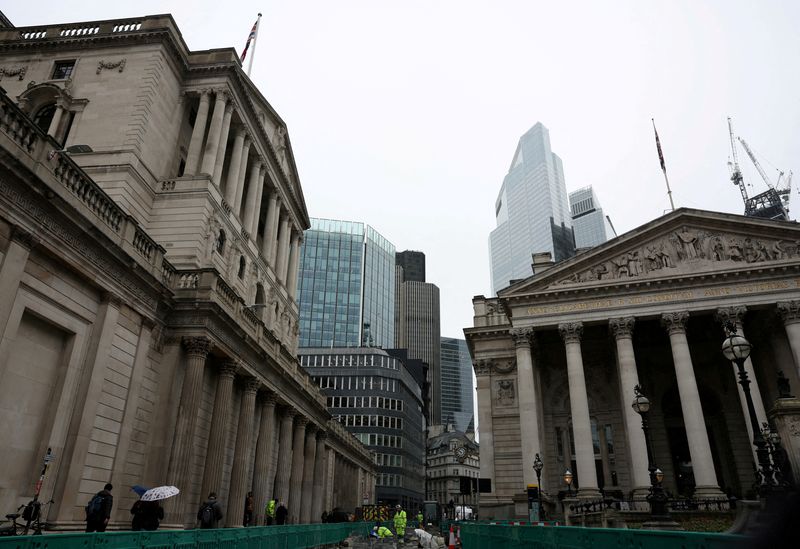By Jonathan Cable
LONDON (Reuters) - The Bank of England will start cutting borrowing costs in the third quarter although 40% of economists saw an earlier trim, according to a Reuters poll which showed it was more likely the first move is later than expected rather than sooner.
That would put it roughly in step with both the United States Federal Reserve and the European Central Bank, both of which are expected to start cutting interest rates in June.
BoE Governor Andrew Bailey said this week central bankers were turning to the question of how long they needed to keep interest rates high and he saw some signs their restrictive policies were succeeding in bringing down inflation pressures.
Inflation has fallen from a 41-year peak of 11.1% set in October 2022 and was expected to drop below the Bank's 2% target to 1.8% next quarter - and hover around the goal until at least end-2025 - giving policymakers room for manoeuvre.
All but three of 68 economists in the March 11-14 poll forecast at least one cut to Bank Rate from its 16-year high of 5.25% by end-September. A firm minority of around 40% said the first cut would come as soon as the next quarter.
No economist surveyed expected a move on March 21 and none expected any further increases following 14 hikes from December 2021 to August 2023.
Quizzed on what was more likely on the timing of the first reduction, almost two thirds of respondents said it was that it comes later than they expect.
"It is more likely they delay. A key hurdle to them beginning to cut rates will be the April minimum wage increase," said Rob Wood at Pantheon Macroeconomics.
Median forecasts showed Bank Rate at 4.75% by end-September and exiting 2024 at 4.50%. It will then steadily fall to finish 2025 at 3.25% in forecasts little changed from a February poll.
That is similar to market pricing for this year.
"By May they are going to be confident inflation is going to be falling and they will be able to say monetary policy is tight. It is an open question how far they can go once the economy builds up some recovery momentum over the course of this year," said Kallum Pickering at Berenberg.
When asked about the magnitude of cuts this year 19 of 25 respondents said it was more likely to be smaller than they expected rather than bigger.
"The recovery in growth and a recovery in the housing market suggests interest rates might not be quite as restrictive as the Bank has been assuming which means they might have a little less room to ease. Nonetheless rates are still in restrictive territory," Pantheon's Wood said.
Britain's economy returned to growth in January after entering a shallow recession in the second half of 2023, official data showed this week, boosted by a rebound in retailing and house-building.
It was expected to expand 0.2-0.3% each quarter through to 2026, the poll found, probably welcome news to Prime Minister Rishi Sunak ahead of an election likely to be held this year.
Across 2024 growth was pegged at 0.3% and in 2025 at 1.2%. February's poll forecasts were for 0.3% and 1.1%.

Businesses had their strongest month in February since May last year but inflation pressures will keep the BoE on alert, according to a survey published on earlier this month.
(For other stories from the Reuters global economic poll:)